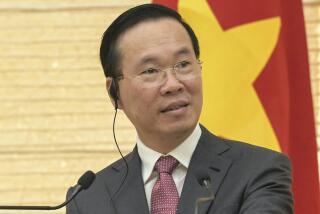Ex-Taiwan chief quits his party
- Share via
BEIJING — Former Taiwanese President Chen Shui-bian resigned from the opposition party Friday after Swiss authorities requested help in an investigation of suspected money laundering involving his family members.
Taiwan’s Justice Ministry said in a statement released late Thursday that its Swiss counterpart wanted information on Chen’s son, Chen Chih-chung, and daughter-in-law, Huang Jui-ching. The island’s authorities said they were cooperating with the inquiry.
Chen’s resignation capped a bad week for the former president. On Thursday, he held a news conference to say that his wife, Wu Shu-chen, had transferred some of the leftover money from presidential and mayoral campaigns to offshore accounts.
“Wu Shu-chen at the beginning of this year admitted that she had sent a portion of leftover campaign funds abroad and didn’t let me know,” he said. “It was meant to be for my use after leaving office.”
Chen’s eight-year administration, which ended in May, was marked by rapid-fire personnel changes, inflammatory statements and the use of controversial referendums that fanned tension in Washington and Beijing. China considers Taiwan part of its territory and has vowed to use force, if necessary, to prevent the island from declaring independence.
“Today it is with great sadness that I apologize to all party members and supporters,” Chen said in a statement Friday announcing his resignation from the now-opposition Democratic Progressive Party, or DPP. “I have disappointed and shamed everyone, and failed to meet everyone’s expectations, doing irreparable harm to the party.”
The recycling of campaign funds was not illegal before 2004. But changes in the law after that required that money be tracked and reported, which Chen and family members apparently failed to do.
“Former President Chen tried to separate himself from his family, but a lot of his supporters are now quite frustrated and don’t believe in him anymore,” said Lin Wen-cheng, a professor at Zhongshan University in Taipei, the Taiwanese capital. “For many, this is the last straw.”
Chen left office because of term limits, but his party was badly defeated in the March presidential election to select his successor. The election of the Nationalist Party’s Ma Ying-jeou has brought a big change in Taiwan’s policies, the most noticeable being improved relations with China. Among the concrete steps negotiated in recent months were expanded tourism and trade links and direct flights.
Taiwanese voters have responded well to improved relations across the Taiwan Strait, but a key question ahead is how much maneuvering room China will allow Taiwan on the international scene.
Taiwan may apply next month to join the United Nations after several failed bids by the Chen administration, although Ma has signaled he might not pursue this option. The bid, sometimes dubbed Taiwan’s “impossible dream,” is largely symbolic anyway, given that China has the power to veto its membership.
But Ma has sought out other avenues, including asking to enter the World Health Assembly next spring. The island also would like some sort of role in the Assn. of Southeast Asian Nations. China is wary of anything that smacks of Taiwanese sovereignty, but blocking these overtures could damage Ma’s popularity among voters and undercut improved relations with Beijing.
Ma is on a trip through Latin America to visit a few of the small number of countries that diplomatically recognize Taiwan rather than China.
En route to Paraguay and the Dominican Republic, Ma stopped over in the U.S. but opted not to meet with politicians or reporters.
“I’m sure this is to the liking of the U.S. government,” said Chao Chien-min, a professor at National Chengchi University in Taipei. “But he’s a bit too square in not taking advantage of this rare chance. He could have used this to boost his popularity.”
Taipei’s shrinking list of diplomatic allies is made up of mostly small countries in Central America, the Caribbean, the South Pacific and Africa that get significant aid from Taiwan. This compares with China’s 170 overseas partners. Ma has vowed to ease the jockeying between the two longtime adversaries sometimes dubbed “dollar diplomacy.”
But if China takes advantage of the situation to win over some of Taiwan’s allies, analysts said, Ma’s core strategy of engaging China could be discredited among his supporters.
“I think to serve their own interests, if they’re smart, they won’t create problems with Taiwan’s diplomatic ties,” Chao said.
--
More to Read
Sign up for Essential California
The most important California stories and recommendations in your inbox every morning.
You may occasionally receive promotional content from the Los Angeles Times.












